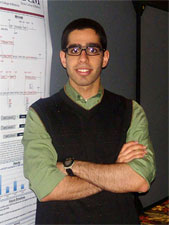|
By Rolando Garcia
Natural Sciences and Mathematics
 For biochemistry senior Nader Zamani, devotion to research does not stop when he leaves the lab bench after a long day. For biochemistry senior Nader Zamani, devotion to research does not stop when he leaves the lab bench after a long day.
“My commitment to the lab extends beyond the hours that I’m physically there,” Zamani said. “Even when I’m not in the lab, I’m thinking about it, troubleshooting, running through problems in my head.”
Zamani’s hard work has yielded an impressive undergraduate research record and his summer project on genetic signatures in melanoma patients won him first place in the annual Houston Premedical Academy Research Symposium sponsored by Baylor College of Medicine.
He has also achieved excellence in the classroom, earning straight A’s in every single course despite working 20-40 hours a week in the lab. Zamani will graduate in May with a 4.0, one of only two NSM grads this semester with perfect marks.
Zamani will pursue an M.D. at the Baylor College of Medicine beginning this fall. Although undecided about what specialization he will choose, Zamani knows he wants to stay involved in medical research as a physician.
He caught the research bug early on while attending the DeBakey High School for Health Professions and participating in a research program for high school students at Baylor. At UH, Zamani worked on bioinformatics and genetic research under biochemistry Professor George Fox, comparing genes in different strains of bacteria resistant to sterilization.
He also worked in the lab of health and human performance Professor Adam Thrasher, where Zamani was involved in a project seeking to prevent pressure ulcers in wheelchair-bound patients by electrically stimulating muscles.
But the research that won him first prize at the Baylor symposium stemmed from a 2009 summer project at the University of Pennsylvania. Zamani studied gene expression profiles from melanoma patients to find the cancer’s genetic signatures. Once scientists understand which specific genes are working (or malfunctioning) to cause melanoma, they can better treat and prevent the skin cancer.
Working on translational research with clinical applications is very rewarding, Zamani said, convincing him doctors can make a difference outside the operating room.
“Even if you don’t see patients, you’re still making an impact and saving lives,” he said.
And far from being a distraction from coursework, the long hours in the lab reinforces and brings to life concepts learned in the classroom, Zamani said. And involvement in research also gives undergraduates valuable personal interactions and mentorships with professors. And UH faculty, he added, are always willing to help their students succeed.
“I initially didn’t think a school of this size could afford so much personal attention,” he said. “I couldn’t have asked for a better undergraduate experience.” |

